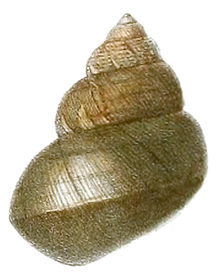| Filopaludina martensi | |
|---|---|

| |
| Drawing of an apertural view of a shell of Filopaludina martensi | |

| |
| Abapertural view of a shell | |
| Conservation status | |
 Least Concern (IUCN 3.1) | |
| Scientific classification | |
| Domain: | Eukaryota |
| Kingdom: | Animalia |
| Phylum: | Mollusca |
| Class: | Gastropoda |
| Subclass: | Caenogastropoda |
| Order: | Architaenioglossa |
| Family: | Viviparidae |
| Genus: | Filopaludina |
| Species: | F. martensi |
| Binomial name | |
| Filopaludina martensi (Frauenfeld, 1864) | |
| Synonyms | |
Filopaludina martensi is a species of large freshwater snail with a gill and an operculum, an aquatic gastropod mollusc in the family Viviparidae.
Description
The shape of the shell is ovate-conic. The apex is acute and violet-black in colour. The umbilicus of the shell is very narrow. There are fine spiral lines on the shell. The color of the shell is green or dark brown-blackish. The shell has 6–7 convex whorls. Whorls are with upper spiral lines, some are obsolescently sculptured. The last whorl is swollen.
The aperture is oblique, ovately rounded. The aperture is cerulean-white in colour. The upper part of the aperture is not acute. The peristome is straight, thick, blunt, often outwardly blackish.
The width of the shell is up to 31 millimetres (1.2 in). The height of the shell is up to 55 millimetres (2.2 in). The length of the aperture is up to 21 millimetres (0.83 in).
The operculum has the color of horn with golden shining and it is widely ovate. There are concentric lines on the operculum.
-
 Outer side of an operculum
Outer side of an operculum
-
 Inner side of an operculum
Inner side of an operculum
Taxonomy
This species was firstly described by Eduard von Martens under the name Paludina cingulata in 1860 based on specimen collected by Henri Mouhot. Georg Ritter von Frauenfeld created a new replacement name Vivipara martensi for this species in 1864, because the name Vivipara cingulata was already used for a fossil species by Philippe Matheron before.
Subspecies
Three subspecies are recognized, but this species and its subspecies require revision.
- Filopaludina martensi cambodiensis Brandt, 1974
- Filopaludina martensi martensi (Frauenfeld, 1864)
- Filopaludina martensi munensis Brandt, 1974
Distribution
This species is found in Cambodia, Indonesia, Laos, Malaysia, Philippines, Thailand and Vietnam. The type locality is "Siam" (a detailed type locality was not given).
Ecology
Filopaludina martensi lives in canals and ponds. It feeds (as do all other Viviparidae) as a filter feeder. There are in development 0–14 juveniles in a brood-pouch of a female. Female gave birth to juveniles mainly at night. Parasites of Filopaludina martensi martensi include:
- Paragonimus siamensis as the first intermediate host.
- at least three species of Echinostomatidae
Parasites of Filopaludina martensi include trematode Multicotyle purvisi.
Human use
Filopaludina martensi is used as part of the cuisine of Thailand.
References
- This article incorporates public domain text from Martens, 1860
- ^ Köhler F., Sri-aroon P. & Simonis J. (2012). "Filopaludina martensi". In: IUCN 2012. IUCN Red List of Threatened Species. Version 2012.2. <www.iucnredlist.org>. Downloaded on 9 November 2012.
- ^ (in German) von Frauenfeld G. R. (1864). "Verzeichnis der Namen der fossilen und lebenden Arten der Gattung Paludina Lam.". Verhandlungen der Kaiserlich-Königlichen Zoologisch-Botanischen Gesellschaft in Wien 14: 561–672. page 588.
- ^ Martens E. v. (1860). "On the Mollusca of Siam". Proceedings of the Zoological Society of London 1860(1): 6–18, page 13.
- ^ Piyatiratitivorakul, Piansiri; Boonchamoi, Pachanee (2008). "Comparative toxicity of mercury and cadmium to the juvenile freshwater snail, Filopaludina martensi martensi". ScienceAsia. 34 (4): 367. doi:10.2306/scienceasia1513-1874.2008.34.367.
- ^ Berry, A. J. (2009). "Reproductive condition in two Malayan freshwater viviparid gastropods". Journal of Zoology. 174 (3): 357–367. doi:10.1111/j.1469-7998.1974.tb03163.x..
- Yaemput, S; Dekumyoy, P; Visiassuk, K (1994). "The natural first intermediate host of Paragonimus siamensis (Miyazaki and Wykoff, 1965) in Thailand". The Southeast Asian Journal of Tropical Medicine and Public Health. 25 (2): 284–90. PMID 7855641.
- Noikong, W.; Wongsawad, C.; Chai, J.-Y.; Saenphet, S.; Trudgett, A. (2014). "Molecular Analysis of Echinostome Metacercariae from Their Second Intermediate Host Found in a Localised Geographic Region Reveals Genetic Heterogeneity and Possible Cryptic Speciation". PLOS Neglected Tropical Diseases. 8 (4): e2778. doi:10.1371/journal.pntd.0002778. PMC 3974680. PMID 24699358.
- Alevs, Philippe V.; Vieira, Fabiano M.; Santos, Cláudia P.; Scholz, Tomáš; Luque, José L. (12 February 2015). "A Checklist of the Aspidogastrea (Platyhelminthes: Trematoda) of the World". Zootaxa. 3918 (3): 339–396. doi:10.11646/zootaxa.3918.3.2. ISSN 1175-5334. PMID 25781098.
External links
- Taeme, Janta; Kruatrachue, Maleeya; Kaewsawangsap, Somboon; Chitramvong, Yaowaluk; Sretarugsa, Prapee; Upatham, E. Suchart (1996). "ACUTE TOXICITY AND BIOACCUMULATION OF LEAD IN THE SNAIL, FILOPALUDINA (SIAMOPALUDINA) MARTENSI MARTENSI (FRAUENFELDT)". ScienceAsia. 22 (3): 237. doi:10.2306/scienceasia1513-1874.1996.22.237.
- Kobelt W. (1909). "Die Gattung Paludina Lam. (Vivipara Montfort) (Neue Folge). In Abbildungen nach der Natur mit Beschreibungen". Systematisches Conchylien-Cabinet von Martini und Chemnitz, Nürnberg, 1(21a): pp. 97–430, plates 15–77., page 203–204, table 41, fig. 7–8.
| Taxon identifiers | |
|---|---|
| Filopaludina martensi | |